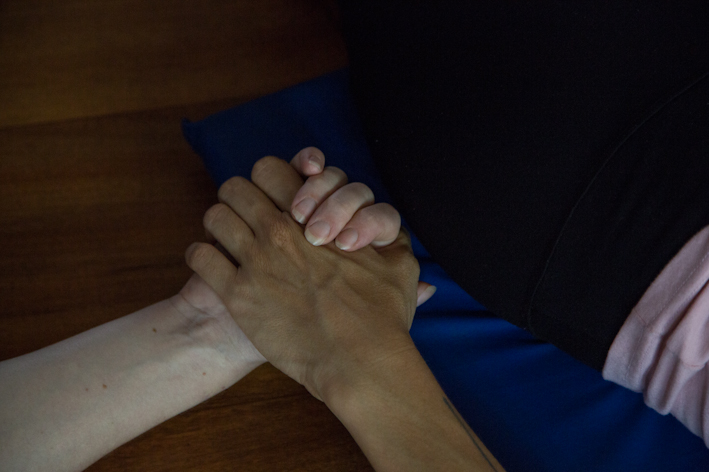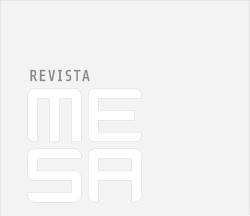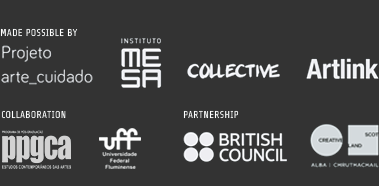
Lygia Clark. Rosácea, 1974/75. Proposition interpreted by Gina Ferreira and carried out in collaboration by Ana Vitória Freire with the participation of Márcia Proença, October 5, 2017, Instituto Nise da Silveira. Photo: Denise Adams
Credits and Acknowledgments
Revista MESA
Editors 5th issue
Alison Stirling
Kate Gray
Izabela Pucu
Jessica Gogan
Editorial Coordinator
Jessica Gogan
Executive Producer
Sabrina Curi
Site design
Monocromo
MESA Visual Identity
Dupla Design
Copy Editing
Ana Carolina Figueiredo De Assis (Portuguese)
Nicola White (English- *Articles and Think Piece)
Translation
Thais Miranda (English – Portuguese)
Jessica Gogan (Portuguese – English)
Additional Translation
Luiz Guilherme Vergara
(Portuguese – English 3 essays Macquinho case study)
(English – Portuguese 2 essays Collective case study)
Made possible by
Project Arte_Cuidado
Instituto MESA
Artlink
Collective
Collaboration
Postgraduate Program in Contemporary Studies of the Arts, Federal Fluminense University (UFF)
Partnership
British Council
Creative Scotland
Cover images
Josemais Moreira Filho. Lanchonete<>Lanchonete. International Encounter Care as Method # 2, 2017
Pamela Perez. Loucura Suburbana [Suburban Madness] Carnaval parade, 2018
Eleonora Fabião. azul azul azul e azul [blue, blue, blue and blue] 2016. Foto: Jaime Acioli
Denise Adams.
– Rosácea at the International Encounter Care as Method # 2, 2017
– Arlindo, Tresformance at the International Encounter Care as Method # 2, 2017
Steve Hollingsworth. Tuesday Sensory Session at Cherry Road, 2017.
Petra Bauer and SCOT-PEP, Workers!, work commissioned by Collective and produced by HER Film, 2018.
Collective Mulheres de Pedra, Elêko, 2015. Still.
ISSN: 2319-0264
About Project Arte_Cuidado
The art_care project is a collective and embryonic initiative that brings together researchers, artists, therapists and managers who work at the interface between the fields of art, health and citizenship in Rio de Janeiro and aims to constitute a network of activation, research, collaboration and exchange. Over the course of 2015 – 2018 the project held various encounters and seminars. In addition to the collaboration of several artists, activists and social agents the project has relied on the participation of the following organizations, initiatives and university programs:
Centro Municipal de Arte Hélio Oiticica
Espaço Aberto ao Tempo
Loucura Suburbana
Macquinho Plataforma Urbana Digital
Museu Bispo Rosário Arte Contemporânea
Museu de Imagens do Inconsciente
Norte Comum
Programa de Pós Graduação em Saúde Coletiva UFF
Programa Médico de Família de Niterói
Programa de Pós Graduação em Estudos Contemporâneos das Artes UFF
Mini bios editorial and production team
Alison Stirling
Studied at Glasgow School of Art and the Royal College of Art. As Artistic Director of Artlink, she has created innovative projects in the public sector for over 24 years. Her current focus is arts practice within The Ideas Team, culminating in a large scale exhibition in 2020. This ongoing work aims to draw attention to and change preconceptions of and ways of caring for, some of the most marginalized in our community.
Kate Gray
Kate Gray has been Director of Collective, Edinburgh since 2009, where previously she led Collective’s One Mile Programme (2006-2009). Collective brings people together around the production of new work and Kate’s program at Collective has a focused on co-production between artists and people who would not describe themselves as artists. Recent commissions have included Dineo Seshee Bopape, Hito Steyerl, Goldin and Senneby, Jesse Jones, Slavs and Tatars, Simon Martin, Grace Schwindt and Petra Bauer. Kate has led the relocation of Collective by repurposing the City Observatory on Edinburgh’s iconic Calton Hill to be a new centre for contemporary art in 2018. She studied at Oxford and Sheffield Hallam Universities before completing an MFA at Glasgow School of Art. She was the first Chair of Rhubaba, artist-run gallery and studios (2014-2017) and is a visiting lecturer at Glasgow School of Art and Edinburgh College of Art.
Izabela Pucu
Izabela Pucu is an artist, curator, researcher and cultural manager. She has a PhD in History and Art Criticism PPGAV / EBA / UFRJ. She was director and curator of the Hélio Oiticica Municipal Art Center (2014-2016) and coordinator of projects of the EAV Parque Lage (2008 to 2011). She was researcher for the book Mário Pedrosa: Primary Documents, eds. Gloria Ferreira and Paulo Herkenhoff (MoMA / NY, 2016) and edited the books Roberto Pontual: Critical work (City Hall of Rio / Azougue, 2013), Imediações: Criticism by Wilson Coutinho (Funarte / Petrobrás, 2008) and was curator of exhibitions such as, “Osmar Dillon: não objetos poéticos” (2015), “Ivan Henriques: Relandscape / Repaisagem” and “A lágrima é só o suor do cérebro” featuring the work of the artist Gustavo Speridião (2016). She is currently coordinator of the Escola de Olhar at the Museum of Art of Rio de Janeiro (MAR).
Jessica Gogan
Gogan is a curator and educator and director of the MESA Institute and co-editor of MESA Magazine. She holds a PhD in Art History from the University of Pittsburgh in the USA (2016). Her research and projects explore the interfaces between art and society focusing on practices that traverse the fields of art, curatorship and education. She recently launched the book Domingos da Criação: Uma coleção do experimental em arte e educação, a research and publication project awarded an Itaú Rumos 2016 grant, exploring the participatory happenings Domingos da Criação held at Museum of Modern Art in Rio de Janeiro in 1971. She currently co-coordinates the Art_Care Project with Izabela Pucu and is a PNPD/CAPES postdoctoral fellow in the Postgraduate Program in Contemporary Studies of the Arts at UFF.
Sabrina Curi
Co-founder and general coordinator of the MESA Institute and producer of MESA magazine. Graduated in Cultural Production from Fluminense Federal University (2002). She was director of development of the Museum of Contemporary Art of Niterói (2013-2017). She is a producer of MESA Magazine (2010-2018) and has recently worked in the production of the Digital Publication Flipping: Revisiting Pop (2018), in the Art Care Project (2017-2018), at the Flipping Pop International Seminar: Revisiting Pop (2017 / MAM-SP ). She also produced the Experimental Nucleus of Education and Art of MAM-RJ (2009 to 2013), education project for the exhibition “Hélio Oiticica Museum is the World” (Paço Imperial / Casa França Brasil, 2010 ) and The Meaning of the Public in the Art (2013-2014 Prize Funarte).
Copy Editing
Ana Carolina Assis
Poet and educator. Graduated in Literature from the Fluminense Federal University, she studied at the same institution, researching poetry, body and schizophrenia in Adília Lopes and Stela do Patrocínio. She has worked with the Experimental Poetry Workshop on various projects such as Almanac Rebolado (2017, Azougue, Experimental Kitchen and Croup). She has poems published in the magazines Garupa and Escamandro, by the Women Writing initiative and in the anthologies Cadernos do CEP and Alto-Mar (2017, 7Letras, org Katia Maciel). Her book of poems The Spring of Plagues is in print and will be published in 2019.
Nicola White
White is a writer and a former curator and documentary maker. Her novel In the Rosary Garden won the Dundee International Book Prize and her short fiction has been widely published and broadcast on Radio 4. She often collaborates with visual artists and arts organization, contributing texts to a range of publications.
Translation
Luiz Guilherme Vergara
Professor in the art department and the Postgraduate Program in Contemporary Studies of the Arts at the Federal Fluminense University (UFF). As former curator/director of the Museum of Contemporary Art in Niterói (MAC) (2005-2008) he curated numerous exhibitions including Poetics of the Infinite (2005) and Lygia Clark: Poetic Shelter (MAC, 2006) as well as the outreach initiative Arte Ação Ambiental [Art Environmental Action] (1998-2014)) working with the favela community of Morro do Palácio. In 2013, on returning to MAC as director (2013-2016), he curated a number exhibitions with Brazilian artists including Alexandre Dacosta, Suzana Queiroga and Carlos Vergara and co-curated the exhibition Joseph Beuys: Res-Publica: Conclamation for A Global Alternative. His research interests focus on the interface between art, museums and society, and he is co-editor of Revista MESA.
Jessica Gogan
(see above)
Thais Miranda
Translator of English, French and Spanish into Portuguese. After graduating in Law from PUC-Rio, she took her first translation course at Brasillis Idiomas and studied Translation and Technologies of Linguistic Information at Instituto Camões. She is currently a postgraduate student in Techniques, Practices and Translation Studies at PUC-Rio.
Acknowledgements
This magazine would not have been possible without the generosity of the contributors and the collaboration of diverse organizations and individuals:
To the authors: Alison Stirling, Abel Luiz, Ana Kemper, Ana Vitória, Ariadne de Moura Mendes, Bia Jabor, Carlos Arthur Felipe, Claire Barclay, Cristina Ribas, Daniel Murgel, Denise Adams, Diana Kolker, Eleonora Fabião, Eliane Carapateira, Elielton Queiroz Rocha, Espaço Aberto ao Tempo, Fernanda Magalhães, Gina Ferreira, Isabella Dias, Izabela Pucu, James Bell, Josemias Moreira Filho, JV Santos, Kate Gray, Kirsten Lloyd, Laura Spring, Leandro Almeida, Leandro Freixo, Lívia Flores, Loucura Suburbana, Lula Wanderley, Luiz Claudio Silva, Luiz Guilherme Barbosa, Luiz Guilherme Vergara, Luiz Hubner, Luiza de Andrade, Marcos Barreto, Millena Lízia, Nicola White, Nuno Sacramento, Márcia Campos, Maria da Penha, Mario Chagas, Pamela Perez, Paula Batelli, Rafael Zacca, Raquel Fernandes, Ricardo Resende, Shona Macnaughton, Steve Hollingsworth, Tania Rivera, Thatiana Diniz, Thelma Vilas Boas, Wendy Jacob.
To the case study institutions: Artlink, Collective, Espaço Aberto ao Tempo, Loucura Suburbana, Macquinho Plataforma Urbana Digital, and Museu Bispo do Rosário Arte Contemporânea and all of their partners, collaborators and supporters.
A special note of thanks also to the Centro Municipal de Arte Hélio Oiticica (CMAHO) under the direction of Izabela Pucu for making possible the Brazil/Scotland Exchange of Method initiative in partnership with Artlink and Collective with the support of British Council and Creative Scotland that sparked the development of the Art_Care project. We are also grateful to the additional organizations, initiatives and programs who collaborated in Care as Method # 2 Encounter in 2017: Museu de Imagens do Inconsciente, Saracura, Lanchonete<>Lanchonete, Programa Médico de Família Niterói and the Postgraduate Programs in Collective Health and Contemporary Studies of the Arts at UFF.
To glossary contributors: Alison Stirling, Ana Teresa Derraik, André Bastos, Angela Carneiro, Annette Krauss, Casa Jangada, Catarina Resende, Cezar Migliorin, Cristina Ribas, Dai Ramos, Eduardo Passos, Enrico Rocha , Fernanda Eugenio, Gladys Schincariol, Iacã Macerata, Lidia Costa Laranjeira, Luiz Guilherme Vergara, Mariana Guimarães, Noelle Resende, Rafa Éis, Rafael Zacca, Ruth Torralba, Steven Hollingsworth, Tulio Batista Franco and Virgínia Kastrup.
To the interviewees of the video Care as method: Abel Luiz, Alex Venâncio, Ana Carvalho, Ana Teresa Derraik, Ariadne de Moura Mendes, Arlindo Oliveira da Silva, Bianca Bernardo, Carla Guagliardi, Clovis Aparecido dos Santos, Eleonora Fabião, Elielton Queiroz Rocha, Elisama Arnaud, Emília Miterofe, Frederico Morais, Gê Vasconcelos, Gina Ferreira, Gladys Schincariol, Glaucia Villas Boas, Hélio Carvalho, Izabela Pucu, Josemias Moreira Filho, Lívia Flores, Luiz Carlos Marques, Luiz Carlos Mello, Lula Wanderley, Luiz Guilherme Vergara, Luiz Hubner, Luiz Sérgio de Oliveira, Magda Chagas, Maria Célia Vasconellos, Pablo Meijueiro, Marcelo Correa, Rafael Zacca, Raquel Fernandes, Ricardo Resende, Rogê de Oliveira Candido, Tânia Marins, Tania Rivera, Túlio Franco, Vitor Pordeus and William Moreira.
To many others for their collaboration and support:
Thais Miranda for the translation of texts from English to Portuguese as part of an internship at MESA (and Rebecca Atkinson and Maria de Lourdes Sette from PUC Rio’s translation program for collaboration in this initiative). Denise Adams for her beautiful photographs; Josemais Moreira Filho for his great images as well; Ana Carolina Figueiredo De Assis and Nicola White for their copy editing; Talita Prestes for transcribing the interview with Vila Autódromo residents and Deborah Morães for the video Lanchonete<>Lanchonete and translation assistance in the Care as Method # 2 encounter.
Acknowledging three important moments of support: Maria Fusco (Edinburgh College of Art) whose selection of editor Jessica Gogan for a writing residency in 2015 serendipitously coinciding with Artlink/Collective/CMAHO exchange of method program in Edinburgh was an important synergy for the meeting of the four editorial minds behind this special issue; Izabela Pucu as director of CMAHO for her support of the Care as Method video and, in particular, Tania Rivera via here commissioning a special edition of the video for her exhibition Lugares do delírio at Museu de Arte do Rio de Janeiro (MAR); and Luiz Guilherme Vergara for his guidance and generous assistance with translations, revisions and copy editing. And for various collaborations and support along the way: Andre Luiz Gonçalves, Antonio Equi, Antonio Manuel, Bárbara Coelho, Caroline Bellomo, Caroline D’Ávila, Guilherme Marcondes, Lu Dayrell, João Gilberto, Juliana Grisolia, Karen Aquini, Silvana Bonfim and Túlio Franco Jr.
And a special thanks for the dedication, generosity, and commitment of Daniel Leão in editing the video Care as method. To Djuly Gava for production assistance and subtitling, Thales Leite for camera work, Erica Castilhos and Talita Prestes for transcribing the video and Josemias Moreira Filho, Leonardo Mantovani and William Moreira who facilitated additional recording and filming.
Thanks also to the various institutions and individuals for the access and permission to use images: Editora Vozes, Editora Edusp, Espaço Aberto ao Tempo, Loucura Suburbana, Museu de Imagens do Inconsciente, Macquinho: Plataforma Urbana Digital and Museu Bispo do Rosário Arte Contemporânea and their representatives in particular Luiz Carlos Mello, Priscilla Moret, Gladys Schincariol, Lula Wanderley, Juliana Grisoli, Josemais Moreira Filho and Raquel Fernandes. With a special thanks to Almir and Delmar Mavignier. Important additional acknowledgments to: Bel Pedrosa who gave permission for the use of photos from her archive of her grandfather Mário Pedrosa, Clarissa Diniz whose research and compilation of material on the experimental collective Nuvem 33 contributed to Lula Wanderley’s video interview and to the many artists who generously shared images of their works and / or artistic collaborations: Carla Gualiardi (Stela Patrocínio) Cristina Salgado, Gê Vasconcelos (Norte Comum), Eleonora Fabião, Hélio Carvalho, Luiz Sérgio Oliveira (No limites do corpo), Marcel Dinahet, Raimundo Rodriguez, Roberta Barros, Dudu Quintanilha, Lívia Flores and João Waldemir.
A special thank you as well to Monochrome for their design / production of Revista MESA in particular Letícia Verona.
We are also most grateful to British Council and Creative Scotland who provided support for the exchanges between Brazil and Scotland and in particular the International Encounter: Care as Method # 2 in 2017, a seed investment that has also contributed to the production of this magazine. Another fundamental support in this regard has been the Postgraduate Program in Contemporary Studies of the Arts at UFF via the collaboration of program professors and students and especially Tania Rivera with whom MESA coordinating editor Jessica Gogan is currently conducting post doctoral studies supported by a PNPD/CAPES grant focusing on concepts of care in contemporaneity drawing on the organizations and cases involved in the Art_Care project.
Finally a deep and endless thank-you to all the many people and organizations who donated their energy and love to this project, reinforcing the importance of another capital – of time, affection, dedication, and community – that has been absolutely key to making this issue possible.
Copyright
The content of the articles is the sole responsibility of the authors. Reproduction, in whole or in part, without prior permission is prohibited. All rights reserved to the authors.
It is forbidden to copy or reproduce, totally or partially, the images and videos without previous authorization of the authors.



